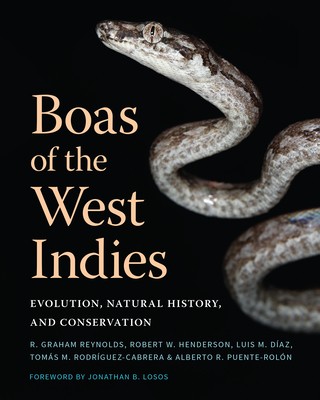
- We will send in 10–14 business days.
- Author: R Graham Reynolds
- Publisher: Comstock Publishing
- Year: 2023
- ISBN-10: 1501765450
- ISBN-13: 9781501765452
- Format: 19.8 x 25 x 0.8 cm, kieti viršeliai
- Language: English
- SAVE -10% with code: EXTRA
Reviews
Description
Boas of the West Indies is a comprehensive survey of boid snakes, commonly known as boas, found on the islands of the Lucayan Archipelago, the Greater Antilles, and the Lesser Antilles. Bringing together the expertise of leading herpetologists R. Graham Reynolds, Robert W. Henderson, Luis M. DÃaz, Tomás Michel RodrÃguez, and Alberto R. Puente-Rolón, this volume synthesizes established knowledge and new findings on the evolutionary biology, natural history, and conservation statuses of these iconic snakes.
One of the most ecologically diverse snake families, boas have inhabited the West Indies for millions of years. From the Cuban boa, which in many folk legends may grow to over twice a person's height, to the Hispaniolan vineboa, discovered only in 2020 and known to measure less than a meter long, Boas of the West Indies examines the eighteen species extant on these islands along with several others now extinct. Species accounts include details such as phenotypic traits, distribution, and behavior. Introductory chapters discuss the history of human-boa interaction, differences between West Indian and neotropical mainland boids, current conservation efforts, and more.
Illustrated with over a hundred color photographs and range maps, Boas of the West Indies is a benchmark reference for herpetologists, conservationists, and snake hobbyists that expands our knowledge of--and celebrates--these fascinating creatures so integral to the ecology of these islands.
EXTRA 10 % discount with code: EXTRA
The promotion ends in 23d.08:21:04
The discount code is valid when purchasing from 10 €. Discounts do not stack.
- Author: R Graham Reynolds
- Publisher: Comstock Publishing
- Year: 2023
- ISBN-10: 1501765450
- ISBN-13: 9781501765452
- Format: 19.8 x 25 x 0.8 cm, kieti viršeliai
- Language: English English
Boas of the West Indies is a comprehensive survey of boid snakes, commonly known as boas, found on the islands of the Lucayan Archipelago, the Greater Antilles, and the Lesser Antilles. Bringing together the expertise of leading herpetologists R. Graham Reynolds, Robert W. Henderson, Luis M. DÃaz, Tomás Michel RodrÃguez, and Alberto R. Puente-Rolón, this volume synthesizes established knowledge and new findings on the evolutionary biology, natural history, and conservation statuses of these iconic snakes.
One of the most ecologically diverse snake families, boas have inhabited the West Indies for millions of years. From the Cuban boa, which in many folk legends may grow to over twice a person's height, to the Hispaniolan vineboa, discovered only in 2020 and known to measure less than a meter long, Boas of the West Indies examines the eighteen species extant on these islands along with several others now extinct. Species accounts include details such as phenotypic traits, distribution, and behavior. Introductory chapters discuss the history of human-boa interaction, differences between West Indian and neotropical mainland boids, current conservation efforts, and more.
Illustrated with over a hundred color photographs and range maps, Boas of the West Indies is a benchmark reference for herpetologists, conservationists, and snake hobbyists that expands our knowledge of--and celebrates--these fascinating creatures so integral to the ecology of these islands.


Reviews